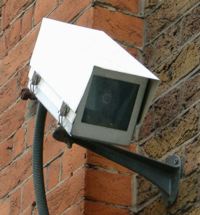Police yesterday released footage of the moment a 16-year-old girl was dragged into bushes as she walked home at 3am. A police officer driving home from work had spotted the girl walking on her own and had rung colleagues at the local police station, telling them to train the camera on her. Officers watching the CCTV footage saw the man carry her 20 yards into bushes.
An urgent message was sent over the police radio and several patrol cars raced to the scene. It is thought the man ran off when he either heard or saw the police cars in the distance. Det Con Mick Blunt, of Adwick CID, said last night:
The feeling among officers is that it could have been a lot worse. A man approached the girl from behind and had a brief conversation before picking her up and dragging her into adjacent bushes. The girl fought back, kicking and screaming, which resulted in her attacker releasing her.
This is good news – the girl was relatively unharmed, if traumatised, and it certainly appears that the CCTV camera was instrumental in saving her. Surveillance cameras are popular with the public precisely for this kind of assistance in crime prevention.
My opposition to surveillance is unabated though. It is based on two arguments. One is, installing a CCTV camera somewhere does not protect people in the area effectively. The effectiveness of such devices is determined by the way in which they are used. In this case, it was the police officer who spotted the girl and decided to instruct his colleagues to train the camera on her who made the difference.
We live in a country with three million surveillance cameras. Why does a case of a surveillance camera being partially instrumental in preventing and potentially solving a crime make it to the headline news? In order to justify the instrusion into its citizens’ privacy, the state has not made a case strong enough for surveillance effectivness. I do not see any corresponding decrease in crime. The only practical use of surveillance camera footage is forensic, after the event. The lenient criminal justice system in the UK is making even that use insignificant.
The main reason of opposing surveillance cameras rather than putting up with a minor ‘inconvenience’ of being monitored in public places (after all, an honest citizen has nothing to hide, does he?) goes to the very nature of the state. Under the guise of public security, governments happily assume the role of the Big Watcher and lay down an infrustructure that give them greater control over the lives of individual citizens. And as Brian pointed out in his post on road pricing and total surveillance, it is impossible to pry it out of the state’s cold intrusive fingers…




